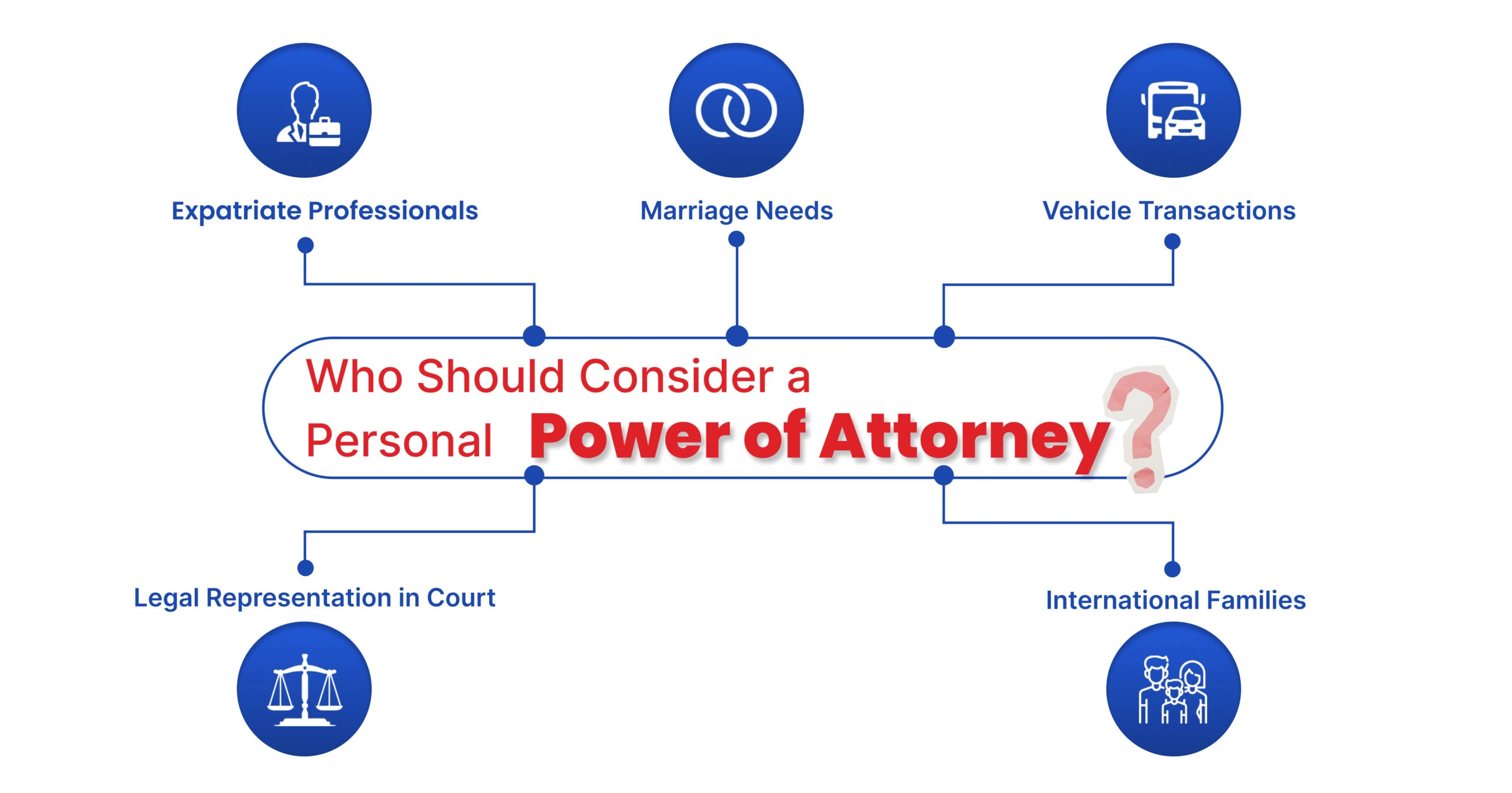A Personal POA allows the Principal to legally authorize the Attorney or Agent to act on their behalf for specific or general purposes. Depending on the requirement, different types of Power of Attorney are used in UAE:
1. General Power of Attorney
A General POA grants broad authority to the agent to manage the principal’s personal, financial, and legal matters. This type of POA is usually used when the principal is unable to handle daily affairs due to travel, illness, or age.
Key Uses: Managing bank accounts, paying bills and taxes, handling investments, representing the principal in routine legal matters, etc.
Note: A General POA becomes invalid if the principal revokes it or passes away.
2. Vehicle Power of Attorney
A Vehicle Power of Attorney authorizes the agent to manage matters related to a motor vehicle on behalf of the owner. The Vehicle POA is commonly used when the owner is living abroad or cannot visit the Regional Transport Office (RTO).
Key Uses: Vehicle registration or transfer, sale or purchase of a vehicle, obtaining a duplicate RC, insurance and pollution certificate formalities, etc.
3. Marriage Power of Attorney
A Marriage Power of Attorney allows one person to represent another for marriage registration or related legal formalities. The Marriage POA is especially useful in cases of NRI or overseas marriages.
Key Uses:
- Marriage registration in India
- Representation before the marriage registrar
- Submission of documents
Important: The actual marriage ceremony usually requires the physical presence of both parties, depending on applicable personal laws.
4. Child Travel Power of Attorney
A Child Travel Power of Attorney authorizes a trusted person to travel with a minor child or make decisions mid-travel in availability of parents.
Key Uses: International or domestic travel, school trips or tours, immigration and airline clearance, emergency decision-making during travel, etc.
The Child Travel POA is often required by airlines, immigration authorities, or schools.
5. Inheritance Power of Attorney
An Inheritance Power of Attorney is used when a legal heir authorizes someone to manage inheritance-related matters on their behalf.
Key Uses: Claiming inherited property or assets, dealing with succession certificates, bank and insurance claims, legal representation in inheritance disputes, etc.
The Inheritance POA is especially useful for heirs residing outside India.
6. Property Power of Attorney
A Property Power of Attorney authorizes the agent to manage, lease, or maintain property on behalf of the owner.
Key Uses: Renting or leasing property, paying property tax and utility bills, property maintenance, representing before housing societies or authorities, etc.
Legal Note: As per Supreme Court rulings, the Property POA does not transfer ownership of property.
7. Property Dispute Power of Attorney
A Property Dispute Power of Attorney allows an agent to represent the principal in legal matters related to property disputes.
Key Uses: Filing or defending property cases, appearing before courts or tribunals, coordinating with lawyers, submitting legal documents, etc.
The Property Dispute POA is common when the property owner cannot personally attend court proceedings.
8. Court Case Power of Attorney
A Court Case Power of Attorney authorizes a representative to act on behalf of the principal in legal proceedings.
Key Uses: Filing petitions and affidavits, court appearances, communicating with advocates, collecting legal documents or orders, etc.
The Court Case POA is often used by senior citizens, NRIs, or individuals with health constraints.
9. Police Clearance Power of Attorney
A Police Clearance Power of Attorney allows the agent to apply for and collect a Police Clearance Certificate (PCC) on behalf of the principal.
Key Uses: PCC for visa or immigration purposes, employment verification, overseas study or work requirements, etc.
The Police Clearance POA is commonly used by individuals residing abroad who need a PCC from the Indian authorities.
10. Litigation Power of Attorney
A Litigation POA authorizes the agent (advocate or representative) to act on behalf of the principal in legal proceedings before courts, tribunals, or other judicial authorities.
Key Uses: Filing and defending cases, signing pleadings and affidavits, appointing advocates, attending hearings, submitting evidence, and carrying out court-related procedural actions.
The Litigation POA is commonly used by individuals or businesses who are unable to appear personally before Indian courts due to residence abroad, health reasons, or professional commitments.















